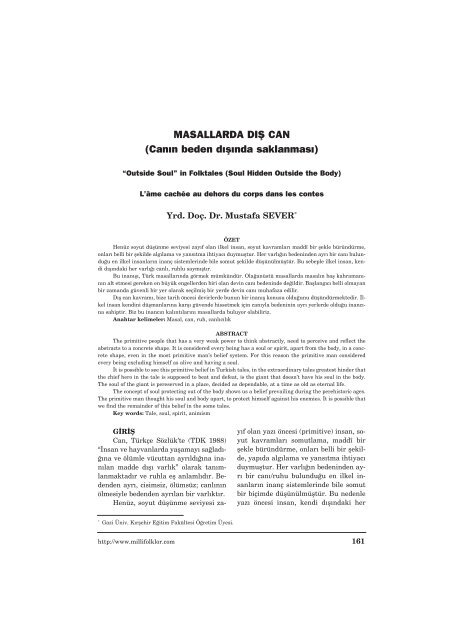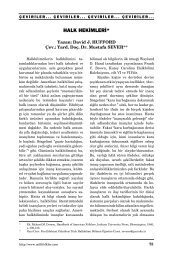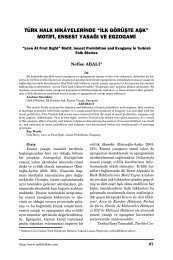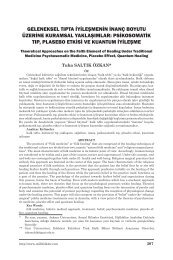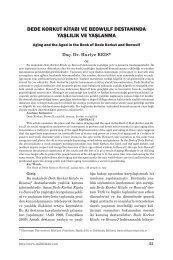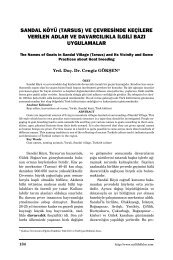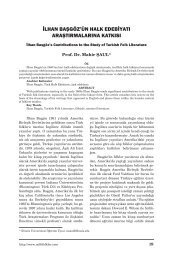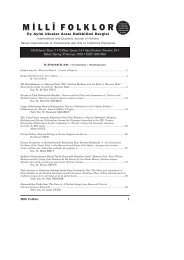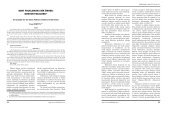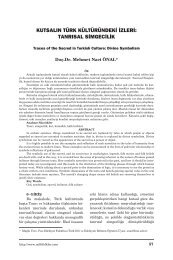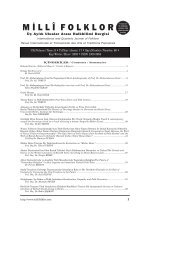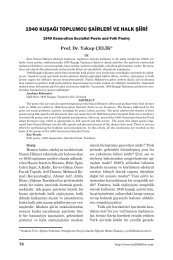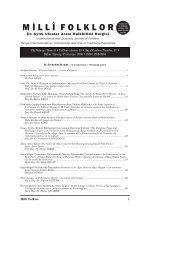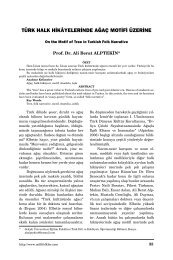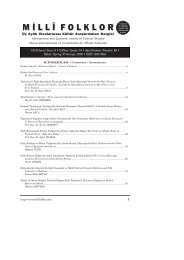You also want an ePaper? Increase the reach of your titles
YUMPU automatically turns print PDFs into web optimized ePapers that Google loves.
MASALLARDA DIfi CAN<br />
(Can›n beden d›fl›nda saklanmas›)<br />
“Outside Soul” in Folktales (Soul Hidden Outside the Body)<br />
L’âme cachée au dehors du corps dans les contes<br />
G‹R‹fi<br />
Can, Türkçe Sözlük’te (TDK 1988)<br />
“‹nsan ve hayvanlarda yaflamay› sa¤lad›-<br />
¤›na ve ölümle vücuttan ayr›ld›¤›na inan›lan<br />
madde d›fl› varl›k” olarak tan›mlanmaktad›r<br />
ve ruhla efl anlaml›d›r. Bedenden<br />
ayr›, cisimsiz, ölümsüz; canl›n›n<br />
ölmesiyle bedenden ayr›lan bir varl›kt›r.<br />
Henüz, soyut düflünme seviyesi za-<br />
Yrd. Doç. Dr. Mustafa SEVER *<br />
ÖZET<br />
Henüz soyut düflünme seviyesi zay›f olan ilkel insan, soyut kavramlar› maddî bir flekle büründürme,<br />
onlar› belli bir flekilde alg›lama ve yans›tma ihtiyac› duymufltur. Her varl›¤›n bedeninden ayr› bir can› bulundu¤u<br />
en ilkel insanlar›n inanç sistemlerinde bile somut flekilde düflünülmüfltür. Bu sebeple ilkel insan, kendi<br />
d›fl›ndaki her varl›¤› canl›, ruhlu saym›flt›r.<br />
Bu inan›fl›, Türk masallar›nda görmek mümkündür. Ola¤anüstü masallarda masal›n bafl kahraman›n›n<br />
alt etmesi gereken en büyük engellerden biri olan devin can› bedeninde de¤ildir. Bafllang›c› belli olmayan<br />
bir zamanda güvenli bir yer olarak seçilmifl bir yerde devin can› muhafaza edilir.<br />
D›fl can kavram›, bize tarih öncesi devirlerde bunun bir inan›fl konusu oldu¤unu düflündürmektedir. ‹lkel<br />
insan kendini düflmanlar›na karfl› güvende hissetmek için can›yla bedeninin ayr› yerlerde oldu¤u inanc›na<br />
sahiptir. Biz bu inanc›n kal›nt›lar›n› masallarda buluyor olabiliriz.<br />
Anahtar kelimeler: Masal, can, ruh, canl›c›l›k<br />
ABSTRACT<br />
The primitive people that has a very weak power to think abstractly, need to perceive and reflect the<br />
abstracts to a concrete shape. It is considered every being has a soul or spirit, apart from the body, in a concrete<br />
shape, even in the most primitive man’s belief system. For this reason the primitive man considered<br />
every being excluding himself as alive and having a soul.<br />
‹t is possible to see this primitive belief in Turkish tales, in the extraordinary tales greatest hinder that<br />
the chief hero in the tale is supposed to beat and defeat, is the giant that doesn’t have his soul in the body.<br />
The soul of the giant is pereserved in a place, decided as dependable, at a time as old as eternal life.<br />
The concept of soul protecting out of the body shows us a belief prevailing during the perehistoric ages.<br />
The primitive man thought his soul and body apart, to protect himself against his enemies. ‹t is possible that<br />
we find the remainder of this belief in the some tales.<br />
Key words: Tale, soul, spirit, animism<br />
* Gazi Üniv. K›rflehir E¤itim Fakültesi Ö¤retim Üyesi.<br />
y›f olan yaz› öncesi (primitive) insan, soyut<br />
kavramlar› somutlama, maddî bir<br />
flekle büründürme, onlar› belli bir flekilde,<br />
yap›da alg›lama ve yans›tma ihtiyac›<br />
duymufltur. Her varl›¤›n bedeninden ayr›<br />
bir can›/ruhu bulundu¤u en ilkel insanlar›n<br />
inanç sistemlerinde bile somut<br />
bir biçimde düflünülmüfltür. Bu nedenle<br />
yaz› öncesi insan, kendi d›fl›ndaki her<br />
http://www.millifolklor.com 161


